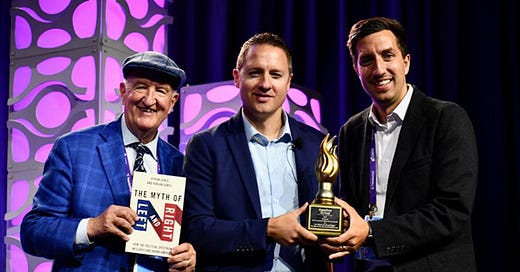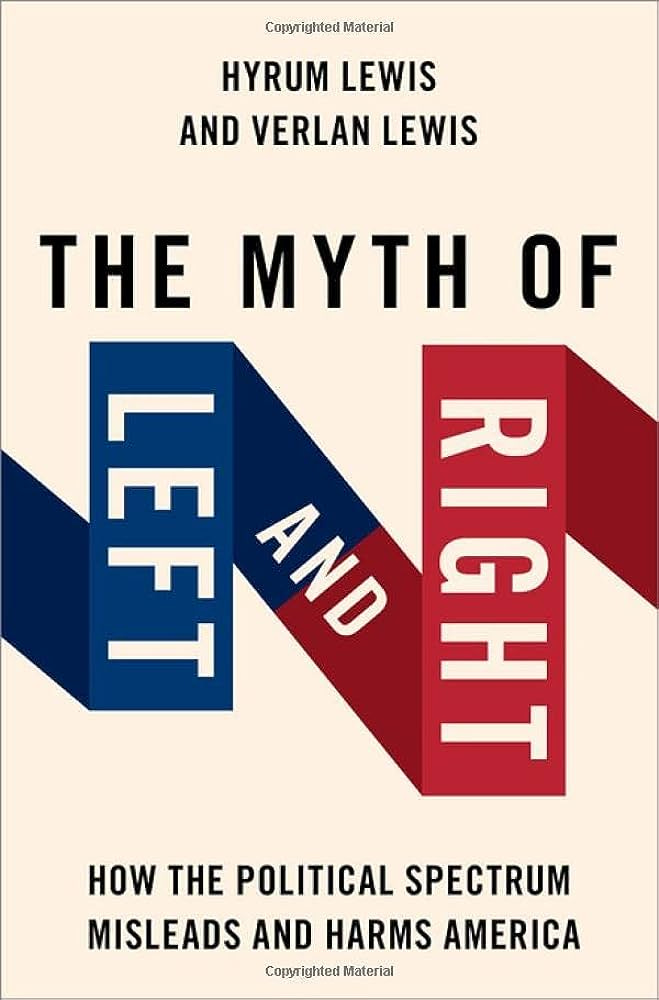
The Myth of Left and Right
Caplan and Hanson Interview the Lewis Brothers on their iconoclastic book
[Here are Robin Hanson’s thoughts on the same book and interview.]
About a year ago, historian Hyrum Lewis emailed me about his new book, The Myth of Left and Right: How the Political Spectrum Misleads and Harms America, co-authored with his brother, political scientist Verlan Lewis. I received a copy, placed it on a stack of unread books, and forgot about it. Until, fortuitously, I bumped into Hyrum at the Memphis Airport after FreedomFest 2023. Hyrum and his brother had just received the Leonard E. “Read This Book Award.”
Long story short: Hyrum and I had a thrilling hour-long pre-flight conversation about our views on the nature of ideology. So great, in fact, that I grabbed The Myth of Left and Right off my stack of unread books as soon as I came home. I devoured it, then passed it onto Robin Hanson, who predictably became a fan in his own right.
The thesis of The Myth of Left and Right: Despite much pretense, neither “left” nor “right” are remotely coherent philosophies. There is no foundational leftist premise from which leftist conclusions flow, nor is there any foundational rightist premise from which rightist conclusions flow. Ideologies don’t just change mightily over the long-run; they change sharply even from one election to another. For intellectually irrelevant reasons.
The Lewis brothers do not defend the moderate position that the two main ideologies fail to make perfect sense. In both print and in-person, they affirm that the two main ideologies make no sense at all. Our political polarization rests on a giant collective delusion.
Provocative! So I decided to I organize a 2x2 interview where Robin and I cross-examine Hyrum and Verlan. As I repeatedly told Lewises, I agree 85%. Which leaves plenty of room for my minimalist Simplistic Theory of Left and Right to breathe. But 85% isn’t good enough for the Lewis brothers. These scholars want unconditional surrender. Agree or disagree, their attitude is most refreshing.
Here’s the full conversation:
Though the interview runs 75 minutes, I was only able to ask two-thirds of my questions. In the hope that one or both of the authors will write a guest post to fill in the gaps, here are my unasked questions.
1. What are the three best bodies of evidence in your favor?
6. Aren’t you holding essentialists to too high of a bar? At any given time, leftist and rightist thinkers disagree, so there’s got to be some room for indeterminacy, right?
11. You seem willing to accept sub-level essentialism, like “support for economic freedom” or “hawkish foreign policy.” But don’t all of your arguments about the logical independence (or “granularity”) of issues apply here, too?
12. Quote from p.79 on raw tribalism versus intellectualized tribalism. True?
13. “The essentialist paradigm is making everyone stupid and evil.” Thinking again on a continuum, what’s the marginal effect?

















The basic and crucial political issue of our age is: capitalism versus socialism, or freedom versus statism. For decades, this issue has been silenced, suppressed, evaded, and hidden under the foggy, undefined rubber-terms of “conservatism” and “liberalism” which had lost their original meaning and could be stretched to mean all things to all men.
-Ayn Rand, 1964
This isn't a new idea-- which is good, given that new ideas are usually wrong. Edward Banfield talked about this in the context of the debates over the American party system in the mid-1950s. Richard Bensel's book on Gilded Age parties-- I think it is called "The Political Economy of American Industrialism"-- makes a similar point. But it is good to have an entire book that focusses exclusively on this issue, and I will definitely read it now. In theory, recognizing that "left" and "right" refer to coalitions and policy positions that are constantly shifting should lead people to be more tolerant. But it won't, in my opinion, because people are naturally tribal, and enjoy feeling hatred for others.